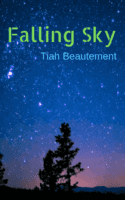“Who do we know; and who do the people we know, know?”
That was the question Musa asked me, after I showed him the instructions on how to make a Galilean telescope.
“I’m not going to ask people for money,” I said. “It’s humiliating. Besides, other than the clients and the big house, nobody we know has money to spare for this kind of thing.”
Musa shook his head. “I don’t mean you should ask people for money. Think about what I’m saying. Where do you get PVC pipe?”
“Hardware store?”
“Khanyisa, go beyond shopping. Who uses PVC pipes every day?”
I smiled. “Plumbers.”
“Exactly, and who do these plumbers hire to do the actual work?”
My smile broadened, “Friends of our fathers.”
He smiled back, “Now you understand. All we need to do is go through that telescope-recipe list you’ve got there, show it to your parents, show it to mine, show it to the other neighbours, and somebody will know somebody, right?”
It worked. At the stables, I already had free access to tools: saws, box cutters, and drills. Then my father talked to a man who worked for a plumber. He gave me a few PCV pipes that had some cracks, but nothing duct tape and problem-solving couldn’t fix. Wasn’t like we needed it to hold liquid, anyway.
We obtained a mailing tube, after Mama told her friend at the local post office about what I was trying to do.
“A telescope? A real one? I will give her the tube if you promise to WhatsApp me photos once it’s done.” Mama agreed.
Musa’s father knew a man who worked in recycling, and had an old box full of broken science equipment. “You think your son’s friend could do something with these?”
The stuff was in bad shape. But after we broke off the casings of some pieces, we found a few lenses in near perfect condition, with only the edges chipped or scratched. But the most important part, the middle, was clear and scratch-free in all of them.
My new telescope was really going to happen!
One day, as Musa and I polished lenses, it occurred to me that we were always talking about my dreams, but never about his own. “What are you going to do next year?” I asked.
He lifted his chin towards the big house. “They’ve offered to pay for Unisa.”
“You’re staying here?”
He smiled, “You telling me you’re disappointed?”
My face felt hot. Truth was, I wasn’t sure how I felt. In a way, happy for me, but, “No … but I thought you wanted out of here, away from the clients.”
He nodded. “They can drive me crazy, but I’ve got ideas, and this is a good place for me to get them going.”
I set down the lens I was polishing, and looked at him. “This is worse than pulling teeth. Are you going to spit it out?”
He chuckled, setting down the lens he was polishing. “I want to do this.” He opened his arms, gesturing to the entire stables.
“You just admitted the clients drive you crazy.”
He shook his head. “Yes, but no. I don’t want to do it like this. I want to set up stables for kids like us, whose parents can’t afford riding lessons. They have soccer programs, surfing programs, cricket and rugby, all getting funding for kids whose parents can’t pay for extras. So why not horses?”
“But why would anybody fund that? Horses are expensive. Soccer programs, yes there are costs, but nothing like paying to feed an animal that weighs 500 kilograms.”
“Because it helps people. Look at why most of the clients start bringing their children here. They come saying their child is shy, doesn’t fit in, isn’t doing well around people. They need confidence.”
“Okay, but you can get that from church.”
He pinched his nose.
***
Tell us: Would you like to learn to horse-ride, or is it a sport for the rich only, as Khanyisa says? Do you know of rural places where ordinary people use horses?


